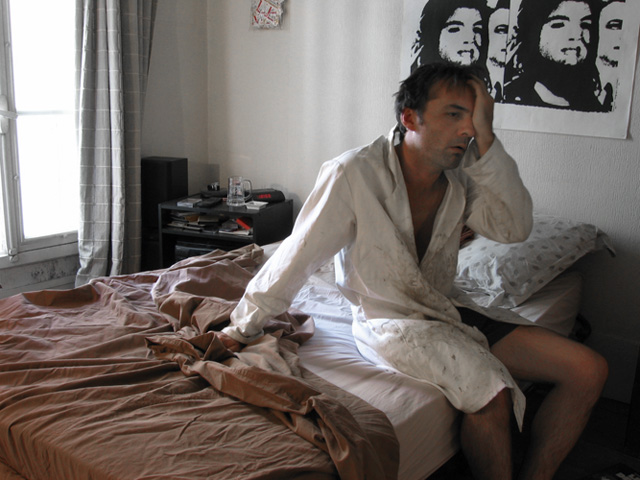I am lying in bed, and I want to stay there. It's warm. I'm comfortable. I feel the weight of the comforter, the cat pressed against my leg. And yet I'm not happy. I think about people who greet the day with smiles. I am not one of them. I think about what I have to do today -- nothing much. And I remember this blog post.
I recall a line from one of Sharon Salzberg's meditations that's stuck with me this week as the 28-Day Meditation Challenge focused on thoughts:
Picture your thoughts like boats on a river.
And I think OK. I bring to mind Sharon's friendly voice telling me to find a comfortable position (got that) and settle into awareness. Then to see thoughts as they arise and to let them pass, like boats on a river. To observe them, not to be them.
I don't want to get up. That's a thought, just a thought. So are the ones that follow: I'm a lazy person for lolling in bed, even though I'm awake. I'm a bad person for not having a full schedule of events planned that propel me out of bed. Those are just the garbage scows of thoughts, threatening to taint the river -- and the day -- with their trash talk.
But they are just thoughts.
And in realizing that, my experience changes. Instead of feeling like a heavy lump of last night's mashed potatoes that has to scraped forcibly out of the bed, I feel lighter. I could get out of bed. Or I could stay here a while longer -- and enjoy it instead of castigating myself for being here. It's a choice.
That's the magic of meditation. When you see that you are not the thoughts, not the anger or smugness or loneliness or the joy and the giggly bliss, you can enjoy the experience of being aware of them, enjoy the space where you are as it is, and choose what to do next without being forced into it.
I got up.
Meditation practice isn't about trying to throw ourselves away and become something better. It's about befriending who we already are. - Pema Chodron ... Meditation.Wednesdays.7:30pm.SamadhiYogaStudio.Manchester CT
Showing posts with label noting thoughts. Show all posts
Showing posts with label noting thoughts. Show all posts
Sunday, February 21, 2016
Tuesday, October 29, 2013
Do you judge people by their phone?
I got a provocative email today asking: "Do people judge you by the
phone you carry?" It went on to detail a survey of 1,000 businesspeople that found in part:
* 55 percent of respondents say that if a business meeting participant pulls out a damaged or old cell phone, this negatively affects their impression of him or her.
* Over 80 percent of people say they judge a person to be “frugal,” “not tech savvy,” or “old” if they carry an older phone model.
* 35 percent of people will think a person is “poor” if they carry an older phone type.
I don't judge you by your phone. I probably couldn't tell anything about your phone just by looking at it. Also, I know young adults who prefer dumb phones -- old school clamshell-style phones that don't connect to the Internet -- so I might think you were cool if you pulled one out. But I am old, frugal, and not tech savvy.
A friend who is so savvy that she works in a tech field admitted that she does make those judgments. Of course you would, if that's your field, like I would be very curious about what you're reading. Avocationally, I would notice your shoes too.
The thing is -- and here's where it relates to meditation -- noticing is not judging. Noticing is just noticing -- that person has an old-style phone. Judging is when you ascribe meaning to what you have noticed -- that person is poor. Judgments often lead to feelings; you may feel pity for the poor person with the old phone or think that your savviness makes you superior. And feelings like to actions: You may treat the person with pity or contempt based on your judgment.
This is why, in meditation, we try to notice thoughts without evaluating or judging them. Thoughts that come up during meditation are not good or bad thoughts, they're just thoughts. All of them. If we catch the thought before it becomes a judgment, it hasn't yet got its hooks into us. But if it moves to a judgment, it grows into a story and becomes an action. (I'm thinking about ice cream when I should be meditating ... that's a bad thought... I need to lose weight ... thinking about food won't help me because I have no will power I'll never lose weight ....)
You can practice noticing without judging -- which is, really, just noticing -- any time. Look around you. Notice something. Look for the moment of noticing before judgment arises. Rest there. When notice judgment arising, and see if you can let it keep going. Judgment is a thought too.
I won't judge you by your phone. But I will judge you if you pull it out while we're speaking.
* 55 percent of respondents say that if a business meeting participant pulls out a damaged or old cell phone, this negatively affects their impression of him or her.
* Over 80 percent of people say they judge a person to be “frugal,” “not tech savvy,” or “old” if they carry an older phone model.
* 35 percent of people will think a person is “poor” if they carry an older phone type.
I don't judge you by your phone. I probably couldn't tell anything about your phone just by looking at it. Also, I know young adults who prefer dumb phones -- old school clamshell-style phones that don't connect to the Internet -- so I might think you were cool if you pulled one out. But I am old, frugal, and not tech savvy.
A friend who is so savvy that she works in a tech field admitted that she does make those judgments. Of course you would, if that's your field, like I would be very curious about what you're reading. Avocationally, I would notice your shoes too.
The thing is -- and here's where it relates to meditation -- noticing is not judging. Noticing is just noticing -- that person has an old-style phone. Judging is when you ascribe meaning to what you have noticed -- that person is poor. Judgments often lead to feelings; you may feel pity for the poor person with the old phone or think that your savviness makes you superior. And feelings like to actions: You may treat the person with pity or contempt based on your judgment.
This is why, in meditation, we try to notice thoughts without evaluating or judging them. Thoughts that come up during meditation are not good or bad thoughts, they're just thoughts. All of them. If we catch the thought before it becomes a judgment, it hasn't yet got its hooks into us. But if it moves to a judgment, it grows into a story and becomes an action. (I'm thinking about ice cream when I should be meditating ... that's a bad thought... I need to lose weight ... thinking about food won't help me because I have no will power I'll never lose weight ....)
You can practice noticing without judging -- which is, really, just noticing -- any time. Look around you. Notice something. Look for the moment of noticing before judgment arises. Rest there. When notice judgment arising, and see if you can let it keep going. Judgment is a thought too.
I won't judge you by your phone. But I will judge you if you pull it out while we're speaking.
Subscribe to:
Posts (Atom)


